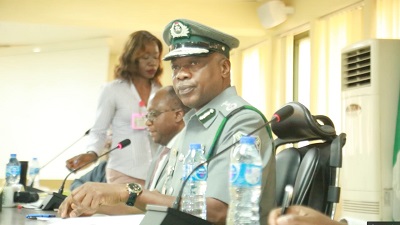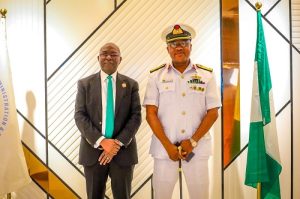Senate Approves Customs N5.09 trn Revenue Target, N706.4bn Budget for 2024

CGC, Adeniyi
• As Service consolidates on technological advancements to enhance trade facilitation
Nigeria’s Senate has approved the sum of N5.079 trillion naira as a revenue target and N706.4 billion as budget for the Nigeria Customs Service (NCS) in the 2024 fiscal year.
The approval follows consideration of a report presentation by the Committee Chairman on Customs, Excise, and Tariff, Jibrin Isah (APC-Kogi), at the plenary last week.
Addressing the plenary, Isah highlighted personnel costs at N225.99 billion and overhead costs at N111.76 billion, representing 31.99 and 15.82 percent of the budget.
“Also, ongoing capital projects stood at N148.42 billion while new projects, which represents 52.19 percent, earmarked for N220.26 billion,” he said
Providing a breakdown of the budget, he added that the timely rollout of the 2024 fiscal policy would enable the service to commence implementation promptly.
In his words, “As part of Customs strategy, the provision of the flexible window will help curb illegally imported vehicles and ensure the proper collection of expected import duties and 25 percent penalty charge from such category of transactions.
“Mechanisms such as systems audit, real-time auditing, post clearance auditing, institution of revenue recovery committee and other intelligence gathering tools will ensure intensive revenue recovery drive.”
The revised penalties and charges in the new Nigeria Customs Service Act, 2023, he noted, will improve the service’s revenue generation.
In the aspect of anti-smuggling and cargo tracking, the committee chairman stated that the service looks forward to collaboration with the Shippers Council and other relevant government agencies to decongest and achieve efficient, effective port operations, which would yield more revenue.
“As provided within the confines of Customs law, all required operational guides will be utilised to ensure that illicit trade that creates a sphere for revenue leakages, as well as economic sabotage, are reduced to the barest minimum,” he concluded.
Meanwhile, the Comptroller-General of Customs (CGC), Bashir Adewale Adeniyi has conveyed a steering committee meeting to consolidate the previous gains achieved in the implementation process of the Nigeria Customs Service (NCS) Trade Modernization Project (TMP) aimed at enhancing trade facilitation.
In a closed-door meeting held at the Customs Corporate Headquarters in Abuja on Thursday last week with members of the TMP Steering Committee, CGC Adeniyi disclosed that the project is geared towards the end-to-end automation of the processes and procedures of the NCS.
According to the CGC, the Trade Modernization Project encompasses the Unified Customs Management System, Trade Portal, and Cargo Release System, alongside Automation Services such as Big Data & AI Integration and Document Management System, as well as Transition & Handbook, covering Technology Upgrades and Enhanced Capacity Building.
The CGC noted that the project has been identified as a milestone, highlighting the significance of digitization for transparency, efficiency, and effectiveness. “It sets the stage for adapting to evolving market dynamics in trade, optimizing operations and procedures, and creating new pathways to unlock revenue streams.” The CGC emphasized
Addressing the members of the NCS TMP Steering Committee, the CGC reiterated that the project is designed to last for twenty years and has three phases, which are Core Services, Automation Services, Transition, and Handback.
He said, “This project will be able to address the challenges before us, answer tough questions, and make good decisions that will propel the service forward. We will discuss some of the highlights in detail so we can review the implementation of decisions taken.”
“I’m optimistic that we will have robust discussions and make very good decisions. I’ve also seen some highlights of the reports of the last meeting. Hopefully, along the line, we will discuss those in detail,” CGC said.
He emphasized that the Team, as it stands, has a solid foundation that will assist them in reviewing the implementation of progressive decisions.
On his part, the Chairman of the Trade Modernization Project Limited, Saleh Ahmadu, reiterated his Team’s full support for the Service.
He revealed that software has been created to integrate revenue collection to support the NCS revenue target of N6 trillion in 2024. He also expressed optimism that the steering committee will strive to overcome their everyday challenges.
“This is to support the CGC’s revenue target of 6 trillion by the year 2024, alongside the many other successes that we will share with you today. We have also faced serious challenges, particularly in sourcing foreign exchange,” he said.
“We will also extend our gratitude to the Federal Government of Nigeria and the Comptroller General of Customs for the continued support of this project. We are a lifelong partner to the Nigeria Customs Service, and together we are changing trade facilitation in Nigeria,” he added.
“We are confident that the support of the steering committee will overcome this. Mr. Chairman, sir, we have hit the ground running as promised,” he expressed.
Nigeria’s Senate has approved the sum of N5.079 trillion naira as a revenue target and N706.4 billion as budget for the Nigeria Customs Service (NCS) in the 2024 fiscal year.
The approval follows consideration of a report presentation by the Committee Chairman on Customs, Excise, and Tariff, Jibrin Isah (APC-Kogi), at the plenary last week.
Addressing the plenary, Isah highlighted personnel costs at N225.99 billion and overhead costs at N111.76 billion, representing 31.99 and 15.82 percent of the budget.
“Also, ongoing capital projects stood at N148.42 billion while new projects, which represents 52.19 percent, earmarked for N220.26 billion,” he said
Providing a breakdown of the budget, he added that the timely rollout of the 2024 fiscal policy would enable the service to commence implementation promptly.
In his words, “As part of Customs strategy, the provision of the flexible window will help curb illegally imported vehicles and ensure the proper collection of expected import duties and 25 percent penalty charge from such category of transactions.
“Mechanisms such as systems audit, real-time auditing, post clearance auditing, institution of revenue recovery committee and other intelligence gathering tools will ensure intensive revenue recovery drive.”
The revised penalties and charges in the new Nigeria Customs Service Act, 2023, he noted, will improve the service’s revenue generation.
In the aspect of anti-smuggling and cargo tracking, the committee chairman stated that the service looks forward to collaboration with the Shippers Council and other relevant government agencies to decongest and achieve efficient, effective port operations, which would yield more revenue.
“As provided within the confines of Customs law, all required operational guides will be utilised to ensure that illicit trade that creates a sphere for revenue leakages, as well as economic sabotage, are reduced to the barest minimum,” he concluded.
Meanwhile, the Comptroller-General of Customs (CGC), Bashir Adewale Adeniyi has conveyed a steering committee meeting to consolidate the previous gains achieved in the implementation process of the Nigeria Customs Service (NCS) Trade Modernization Project (TMP) aimed at enhancing trade facilitation.
In a closed-door meeting held at the Customs Corporate Headquarters in Abuja on Thursday last week with members of the TMP Steering Committee, CGC Adeniyi disclosed that the project is geared towards the end-to-end automation of the processes and procedures of the NCS.
According to the CGC, the Trade Modernization Project encompasses the Unified Customs Management System, Trade Portal, and Cargo Release System, alongside Automation Services such as Big Data & AI Integration and Document Management System, as well as Transition & Handbook, covering Technology Upgrades and Enhanced Capacity Building.
The CGC noted that the project has been identified as a milestone, highlighting the significance of digitization for transparency, efficiency, and effectiveness. “It sets the stage for adapting to evolving market dynamics in trade, optimizing operations and procedures, and creating new pathways to unlock revenue streams.” The CGC emphasized
Addressing the members of the NCS TMP Steering Committee, the CGC reiterated that the project is designed to last for twenty years and has three phases, which are Core Services, Automation Services, Transition, and Handback.
He said, “This project will be able to address the challenges before us, answer tough questions, and make good decisions that will propel the service forward. We will discuss some of the highlights in detail so we can review the implementation of decisions taken.”
“I’m optimistic that we will have robust discussions and make very good decisions. I’ve also seen some highlights of the reports of the last meeting. Hopefully, along the line, we will discuss those in detail,” CGC said.
He emphasized that the Team, as it stands, has a solid foundation that will assist them in reviewing the implementation of progressive decisions.
On his part, the Chairman of the Trade Modernization Project Limited, Saleh Ahmadu, reiterated his Team’s full support for the Service.
He revealed that software has been created to integrate revenue collection to support the NCS revenue target of N6 trillion in 2024. He also expressed optimism that the steering committee will strive to overcome their everyday challenges.
“This is to support the CGC’s revenue target of 6 trillion by the year 2024, alongside the many other successes that we will share with you today. We have also faced serious challenges, particularly in sourcing foreign exchange,” he said.
“We will also extend our gratitude to the Federal Government of Nigeria and the Comptroller General of Customs for the continued support of this project. We are a lifelong partner to the Nigeria Customs Service, and together we are changing trade facilitation in Nigeria,” he added.
“We are confident that the support of the steering committee will overcome this. Mr. Chairman, sir, we have hit the ground running as promised,” he expressed.





